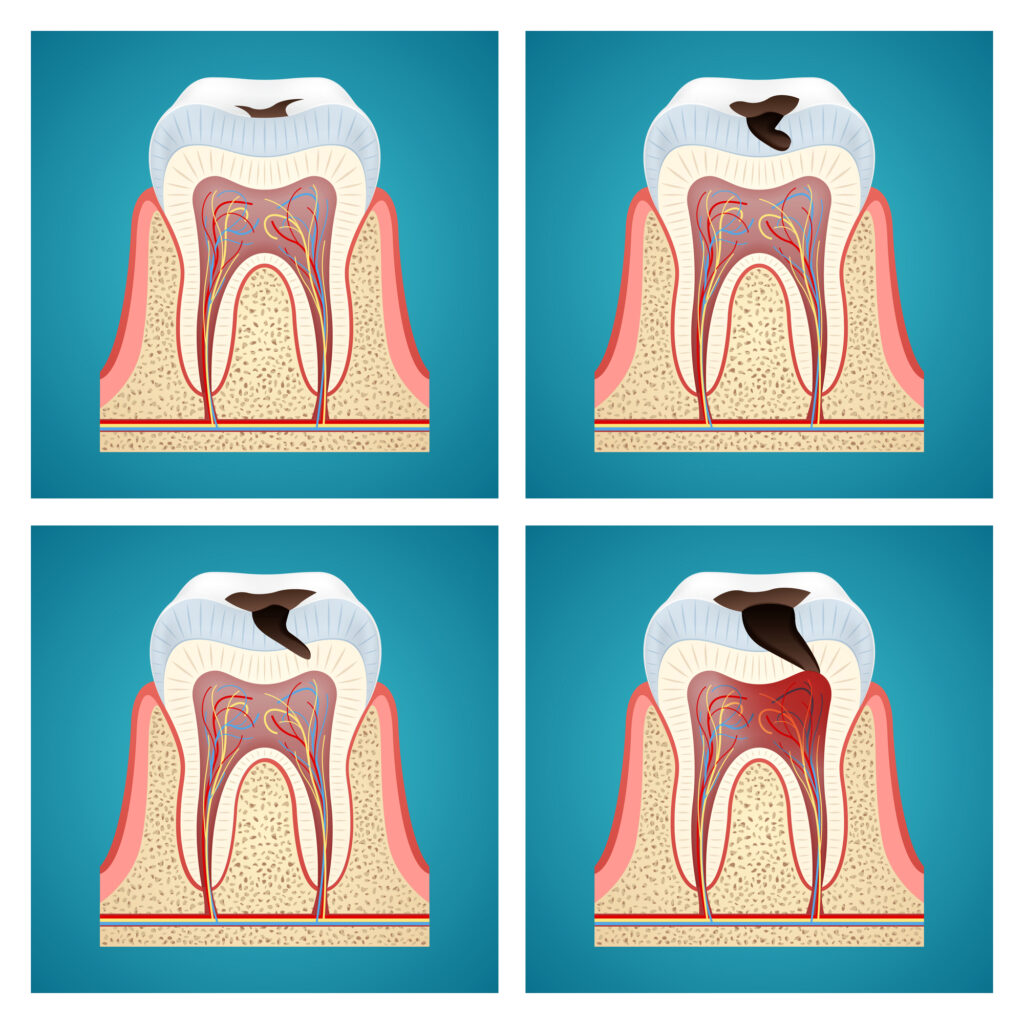What’s The Best Way to Floss
We all know we should floss, but it can be tough. Part of this is because flossing can feel like an extra task in an already busy day, but it...

Tooth decay is a common dental problem that affects people of all ages. It is essential to understand the stages of tooth decay and take preventive measures to maintain a healthy smile. Let’s dive into the stages of tooth decay, so you can understand why it is important to treat it as soon as possible for a better outcome.
Tooth decay is a progressive condition that damages the tooth structure. It occurs when bacteria in the mouth produce acids that erode the tooth’s enamel, dentin, and, in severe cases, the pulp.
Various factors contribute to tooth decay, including:
The process of tooth decay involves several stages, each with its signs and symptoms. If you suffer from tooth decay, recognizing tooth decay early in the process can improve your outcome.
The first stage of tooth decay involves demineralization or the loss of minerals from the tooth’s enamel. At this stage, a white or brown spot may appear on the tooth surface. This stage is often reversible with good oral hygiene practices and the use of fluoride toothpaste or treatments.
If left untreated, the demineralized spot on the tooth enamel will progress into a cavity. At this stage, the decay has penetrated the tooth’s outer layer, and a dentist will need to remove the decayed portion and fill the cavity to prevent further damage.
As the decay progresses, it reaches the dentin, which is the layer beneath the enamel. The dentin is softer than the enamel and is more susceptible to decay. At this stage, you may experience sensitivity or pain when consuming hot, cold, or sweet foods and drinks.
The decay can eventually reach the tooth’s pulp, which contains blood vessels and nerves. Pulp decay can cause a severe toothache, and the tooth may become infected. A root canal or tooth extraction may be necessary to treat the infection and alleviate pain.
If the infection is not treated, it can spread to the surrounding tissues, resulting in a painful abscess. This stage may also cause facial swelling and fever. Immediate dental treatment is required to prevent the infection from spreading further. An Abscess is considered a serious dental emergency.
Preventing tooth decay involves taking care of your teeth and gums by following these steps:
Maintain good oral hygiene: Brush at least twice a day using a fluoride toothpaste, plus floss daily to remove plaque and food from between your teeth.
Cut sugar: Try to limit the consumption of sugary snacks, sodas, and other acidic foods and drinks. Opt for healthier alternatives like water, milk, and fresh low-acid fruits and vegetables.
Try Sealants: Dental sealants are thin, protective coatings applied to the surfaces of molars, preventing bacteria and food particles from accumulating in the grooves. Sealants are especially beneficial for children and teenagers, as they can significantly reduce the risk of cavities.
Choose sugar-free gum: Chewing sugar-free gum after meals can help stimulate saliva production, which helps neutralize acids and rinse away bits of food. If your gum contains xylitol, that’s a bonus because this natural sweetener has been shown to inhibit the growth of cavity-causing bacteria.
Practice good nutrition: A balanced diet rich in vitamins and minerals is essential for maintaining strong teeth and gums. Calcium and vitamin D are particularly important for dental health, as they help strengthen tooth enamel and support bone health.
Wear your night guard: If you grind or clench your teeth (bruxism), using a custom-fitted mouthguard can help protect your teeth from excessive wear and potential fractures.
Visit the dentist: Schedule dental check-ups and cleanings at least twice a year. Your dentist is an expert at detecting early signs of tooth decay and providing treatments to prevent further progression.
If it’s time for your dental check-up, or you suspect you may be experiencing tooth decay at any stage, schedule an appointment!